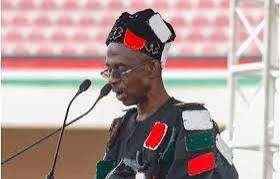Aseidu Nketiah calls for unity
Asiedu Nketiah, a prominent figure in Ghanaian politics, has been known for his unwavering commitment to the National Democratic Congress (NDC) and his fierce advocacy for social justice. Recently, he has made headlines by calling for unity within the party and the broader Ghanaian political landscape. Nketiah’s call for unity comes at a crucial time, as the nation approaches the 2024 elections, a period marked by intense political activity, debate, and campaigning.
In a speech that resonated widely across party lines, Nketiah emphasized that unity is essential for the NDC to regain power and lead the country effectively. According to him, a divided party cannot achieve the goals and aspirations of its supporters and, ultimately, the people of Ghana. He urged members of the NDC to put aside personal differences, prioritize the party’s agenda, and work collaboratively to strengthen the party at both grassroots and national levels. His message was clear: without unity, the NDC would face significant challenges in achieving victory in the upcoming elections.
Nketiah’s appeal for unity is not only directed at the NDC but also at Ghana’s political environment as a whole. The current political climate is highly polarized, with parties often prioritizing competition over collaboration. This division, he argued, is detrimental to Ghana’s democratic development and economic progress. He stressed that political parties should, instead, find common ground on key national issues, such as economic growth, education, and healthcare, and work together to address them for the benefit of all citizens.
A key aspect of Nketiah’s message was the importance of internal cohesion within the NDC. He pointed out that internal conflicts and factionalism have often weakened political parties, making them vulnerable to external attacks and reducing their chances of success in elections. He urged party members to approach differences with maturity, focusing on constructive dialogue and consensus-building rather than confrontation and divisiveness. This, he suggested, would not only strengthen the NDC but also set a positive example for other political entities in Ghana.
In his speech, Nketiah highlighted the historical struggles of the NDC, recalling the party’s journey from its founding years to its current status as one of Ghana’s leading political forces. He reminded party members of the core values of the NDC, such as solidarity, integrity, and social justice, which have been central to its identity and success. He argued that these values should guide members in their interactions with one another and in their efforts to build a stronger, more united party. By adhering to these principles, he believes that the NDC can overcome internal divisions and present a united front to the electorate.
Furthermore, Nketiah acknowledged the contributions of both current and past leaders of the NDC, including former Presidents Jerry John Rawlings, John Atta Mills, and John Dramani Mahama. He noted that each leader brought unique strengths to the party and played a pivotal role in shaping its identity and vision. He urged party members to draw inspiration from their legacies and to build on their achievements by fostering a culture of unity and collaboration.
In addition to unity within the NDC, Nketiah also called for peaceful and respectful relations between the NDC and other political parties, particularly the ruling New Patriotic Party (NPP). He emphasized that while political competition is healthy for democracy, it should not lead to hostility or enmity between parties. He encouraged both parties to engage in constructive dialogue and to respect each other’s views, even when they disagree. He argued that such an approach would not only improve the political atmosphere in Ghana but also enhance the country’s democratic image on the international stage.
As Ghana approaches its 2024 general elections, Nketiah’s call for unity is timely and relevant. His message serves as a reminder that political success depends not only on strong leadership but also on a shared commitment to common goals and values. By promoting unity within the NDC and advocating for peaceful relations with other parties, Nketiah is setting a tone of cooperation and inclusivity that could have a lasting impact on Ghanaian politics.
In conclusion, Asiedu Nketiah’s call for unity is a powerful message that resonates beyond the NDC. It highlights the importance of solidarity, both within political parties and in the broader political landscape, as Ghana prepares for a pivotal election. Nketiah’s appeal underscores the need for collaboration, mutual respect, and a shared commitment to national progress, qualities that are essential for building a stronger, more democratic Ghana.




No comments yet
Be the first to share your thoughts!